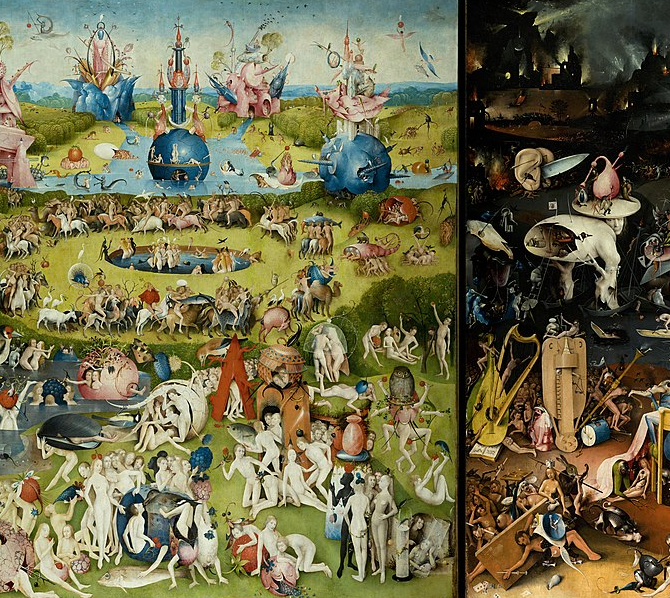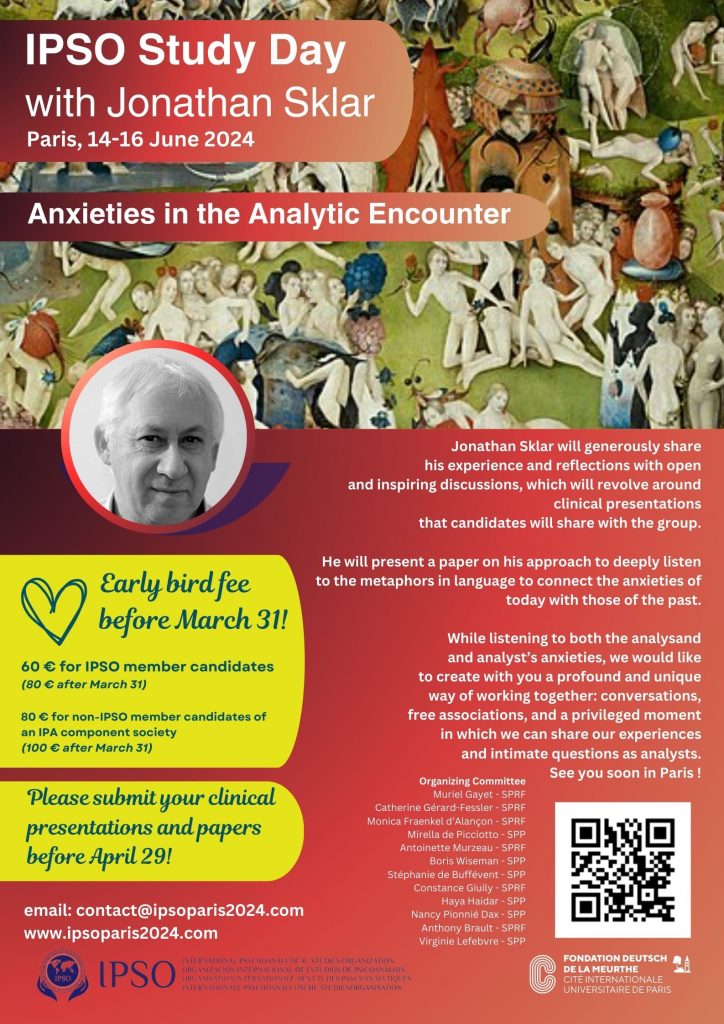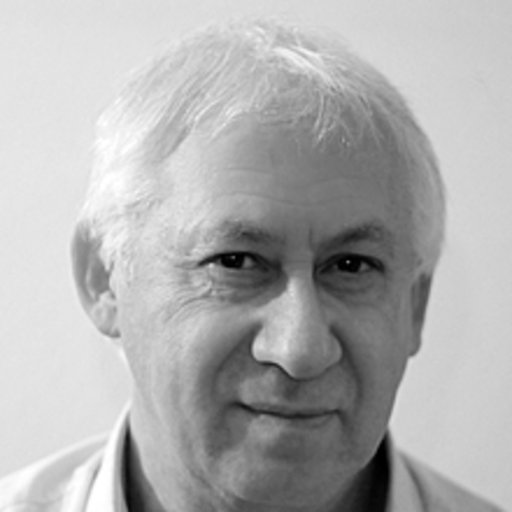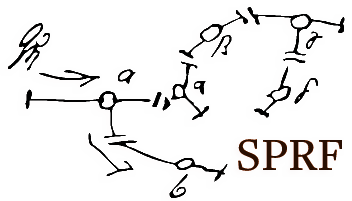
IPSO Study Day
Paris
with
Jonathan Sklar
14-16 June 2024
Anxieties
in the Analytic Encounter

Argument
The analytic encounter is a scene of anxieties, involving both patient and analyst, around loving and hateful feelings and the dread of knowledge.
In Inhibitions, Symptoms and Anxiety 1, Sigmund Freud defines anxiety as an affect experienced by the self in the face of danger, which, in final analysis, always means fear of separation and loss of object. Anxieties related to the infantile are replayed in the transference and counter-transference. They are currently finding new variations in an external world in turmoil: pandemic, climate change, war in Europe, destabilisation of democracies, artificial intelligence… So, when collective history breaks into our individual histories, such as developed in the “Dark Times” 2 by Jonathan Sklar, anxieties triggered by the external world, also need to be heard by the analyst from the point of view of the unconscious. This includes the unrepresented ghosts as well as empty states of mind that preoccupy many of our patients suffering unconscious trans-generational trauma.
Meeting with the unconscious of the analysand and oneself is our task. It takes time beyond the training to gain experience. How do we listen to our patients when we ourselves are anxious about current events and prospects?
Anxiety also felt in the psyche-soma of the analyst cannot be hidden. How does the complexity of the analytic encounter lead us, as analysts, to ambivalence, withdrawal and struggle in the face of uncertainty and intensity? Can this hinder our ability to offer analysis, to work out our patients’ resistance or to maintain an analytical framework? Authenticity is essential. An ability to ‘go there’ and be with the patient offers the best chance of analytical help. Patients can lose (again) a capacity to hope on the journey. We therefore rely on our own creative capacities found and developed in our own analysis such that our hope carries the endeavour and trust is found.
The analyst is invariably faced with a necessary choice to be brave: to dare to look behind the door, confront the repressed monsters 3, and thus make the manifestation of the infantile anxieties visible that underlie the painful experiences felt vis-à-vis internal and external objects, and the real world. Patients are not the only ones who are afraid… So are we! It is a challenge to be a brave enough analyst over time whilst meeting and holding the brave analysand.
Jonathan Sklar will generously share his experience and reflections with open and inspiring discussions, which will revolve around clinical presentations that you would like to share with the group. He will present a paper on his approach to deeply listen to the metaphors in language to connect the anxieties of today with those of the past.
We would like to create with you a profound and unique way of working together: conversations, free associations, and a privileged moment in which we can share our experiences and intimate questions as analysts.
We hope to see you and look forward to meeting you soon in Paris!
Version française de l’argument / In French
La rencontre analytique est le théâtre d’angoisses, ressenties par le patient et par l’analyste, autour de sentiments animés par l’amour, la haine et la peur de se confronter à la réalité intime.
Dans Inhibition, symptôme et angoisse 1, Sigmund Freud définit l’angoisse comme un affect éprouvé par le moi face à un danger, ce qui, en dernière analyse, peut signifier la peur de la séparation et de la perte d’objet.
Les angoisses liées à l’infantile se rejouent dans le transfert et le contre-transfert. Mais elles trouvent aussi de nouvelles déclinaisons dans un monde extérieur en ébullition : pandémie, changement climatique, guerre en Europe, déstabilisation des démocraties, intelligence artificielle… Ainsi, lorsque l’histoire collective fait irruption dans nos histoires individuelles, les angoisses liées à une période de “Dark Times“2, comme le souligne Jonathan Sklar, ont également besoin d’être entendues par l’analyste du point de vue de l’inconscient. Il peut s’agir, entre autres, de fantômes non représentés ainsi que d’états de vide qui préoccupent patients et analystes, reliés à des traumatismes transgénérationnels.
Etre à l’écoute de l’inconscient de l’analysant tout en étant attentif aux manifestations du nôtre, c’est la base de notre travail de psychanalyste. Mais bien au-delà de la formation d’analyste, il faut du temps pour apprendre et acquérir de l’expérience. Alors comment écouter nos patients quand nous sommes nous-mêmes angoissés par l’actualité et les perspectives d’avenir ?
Le psyché-soma de l’analyste ne peut pas cacher l’anxiété lorsqu’elle se manifeste. La complexité de la rencontre analytique peut ainsi nous conduire, en tant qu’analystes, à l’ambivalence, au retrait, à vouloir réduire l’incertitude et fuir l’intensité des éprouvés. Cela peut-il entraver notre capacité à oser proposer l’analyse à nos patients, à travailler sur leurs résistances ou à maintenir un cadre analytique ? L’authenticité est ici essentielle. C’est la capacité à “y aller” et à être avec le patient qui lui offre les meilleures chances de tirer profit de notre aide. Pour que le patient ne perde pas, à nouveau, espoir, nous devons nous appuyer sur les capacités créatives, trouvées et développées dans notre propre analyse, pour être porteurs d’un espoir qui va soutenir l’effort du patient.
L’analyste se doit donc d’être courageux : oser regarder derrière la porte, affronter les monstres refoulés 3, et identifier les angoisses infantiles qui rendent douloureuses les relations avec les objets internes, externes et le monde réel. Les patients ne sont pas les seuls à avoir peur… Nous aussi ! Quel défi d’être et de rester un analyste brave enough au fil du temps, au plus près de nos patients !
Jonathan Sklar partagera généreusement son expérience et ses réflexions, avec des discussions ouvertes et inspirantes, qui tourneront autour des présentations cliniques que vous souhaiterez partager avec le groupe. Il présentera notamment une approche, qui consiste à écouter profondément les métaphores du langage pour relier les angoisses d’aujourd’hui à celles du passé.
Nous aimerions créer avec vous une façon profonde et unique de travailler ensemble : des conversations, des associations libres et un moment privilégié où nous pouvons partager nos expériences et nos questions intimes en tant qu’analystes.
Nous espérons vous voir et nous réjouissons de vous rencontrer bientôt à Paris !
1 Freud, Sigmund. (1926d [1925]). Hemmung, Symptom und Angst, Leipzig-Vienna-Zurich, Internat. Psychoanal. Verlag; G.W., 14:111-205; Inhibitions, symptoms, and anxiety. SE, 20: 77-172.
2 Sklar, Jonathan. (2019), Dark Times, Psychoanalytic Perspectives on Politics, History and Mourning. Phoenix.
3 The Sleep of Reason Produces Monsters. Goya Los Caprichos number 43, 1799
https://www.museodelprado.es/en/the-collection/art-work/the-sleep-of-reason-produces-monsters/e4845219-9365-4b36-8c89-3146dc34f280
” Together we will be meeting to discuss the many forms of fear for the future that besets our world today.
Severe climate change, war, nuclear threat and totalitarianism are todays four horsemen of the apocalypse. Analysands and psychoanalysts need to realise the unconscious terrain of anxieties and develop bravery as our clinical encounters meet and holds the ghosts of past trans-generational trauma that returns to us as a haunting.I look forward to discussions of your clinical work as this IPSO Study Day contains the environment of fragments, myths, monsters and storytelling with thoughtful understanding and fortitude through free association and metaphor.”
Jonathan Sklar

The Organizing Committee
Muriel Gayet, Catherine Gérard-Fessler, Monica Fraenkel d’Alançon,
Mirella de Picciotto, Antoinette Murzeau, Boris Wiseman, Stéphanie de Buffévent, Constance Giuily, Haya Haidar, Nancy Pionnié Dax, Anthony Brault, Virginie Lefebvre…
We are a team of french IPSO members (candidates and newly qualified members) from:


